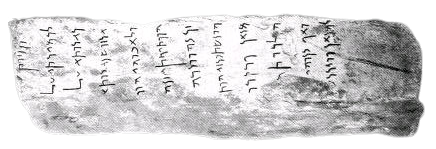There are many people who go about the internet sharing stuff,for example the Lord's Prayer in Aramaic ,the Syriac version ,'in the language of Jesus Christ' as they say.
This is utterly wrong and a common misconception among those who know very little about Aramaic if any. They just share links of what they think is in the language of Jesus Christ.
First off Jesus did not speak Syriac but he spoke Galilean Aramaic. Syriac came later. It appeared at about 100 AD in Edessa and it became a major literary language of the Middle East for the Syriac Christianity from 4 to 7 AD.
Furthermore Galilean and Syriac belong to different branches within the Aramaic language family. Galilean belonged to the Western branch of the Aramaic languages while Syriac to the Eastern.
Text in Galilean ,the Herodian script.
Not only that but they are written in different alphabets ,too. Galilean is written in a square script, the so-called Herodian script is preferred which came from Phoenician and resembles the Hebrew alphabet. While Syriac evolved later and is written in a cursive form which was apparently influenced by Byzantine Greek minuscule.
Syriac cursive
As you would have noticed I spoke about the Aramaic language family not Aramaic language. And that is true indeed. Aramaic is not a monolithic language but a whole bunch of related dialects-languages from different times too. From antiquity to modern times.
Byzantine Greek minuscule.
So, when you speak about Aramaic you need to clarify which Aramaic. Galilean? Syriac? Classical Syriac?Assyrian Neo-Aramaic? Mandaic? Turoyo? And these are but a few of the Aramaic bunch.
You also need to know which time you are referring to. Proto-Aramaic ? Aramaic of the Persian Empire? Aramaic of Syriac Christians of classical antiquity? Modern Neo-Aramaic languages?
So, keep in mind that Aramaic is not one language like a big monolith that stands from ancient times through eternity unchanged. Aramaic is a whole language family with different branches, dialects and from different times,too.
Languages change. They evolve ,break up into dialects,get influenced by other languages. Some survive the test of time ,others disappear. That's the way languages work.
I hope this helped a bit to clear up the Aramaic mess.




